Lerone Martin’s new book began with a cup of coffee that led him to sue the FBI.
While working on a book about religious broadcasters, a colleague suggested over coffee that Martin, a religion scholar, research the FBI to see if they had any related files. At the time, the colleague, scholar William J. Maxwell, author of “F.B. EYES,” had been studying the FBI’s surveillance of Black writers. Perhaps the FBI had been keeping an eye on religious broadcasters as well.
Martin, then living in St. Louis, began filing Freedom of Information requests. Around the same time, he was also hearing from local pastors in St Louis who had been contacted by the FBI in the wake of the shooting of Michael Brown in Ferguson. The FBI, they told Martin, wanted to know what the pastors were going to do to calm protests in that city.
“That got me thinking,” said Martin. “This is not a surveillance story. This is a story of partnership.”
Martin began thinking about the kinds of pastors the FBI might want to partner with. Chief among them was the late evangelist Billy Graham, known for his crusades for Jesus and against communism and liberals.
Your tax-deductible gift helps our journalists report the truth and hold Christian leaders and organizations accountable. Give a gift of $30 or more to The Roys Report this month, and you will receive a copy of “Hurt and Healed by the Church” by Ryan George. To donate, haga clic aquí.
When Graham died in 2018, Martin asked for his FBI file. The Department of Justice said no. So, Martin sued in federal court and three years later settled with the FBI and got the files. He also obtained files on other Christian leaders and organizations, most notably more than a thousand pages of documents outlining the relationship between longtime FBI director J. Edgar Hoover and the editors of Christianity Today, the flagship publication of Graham’s evangelical movement.
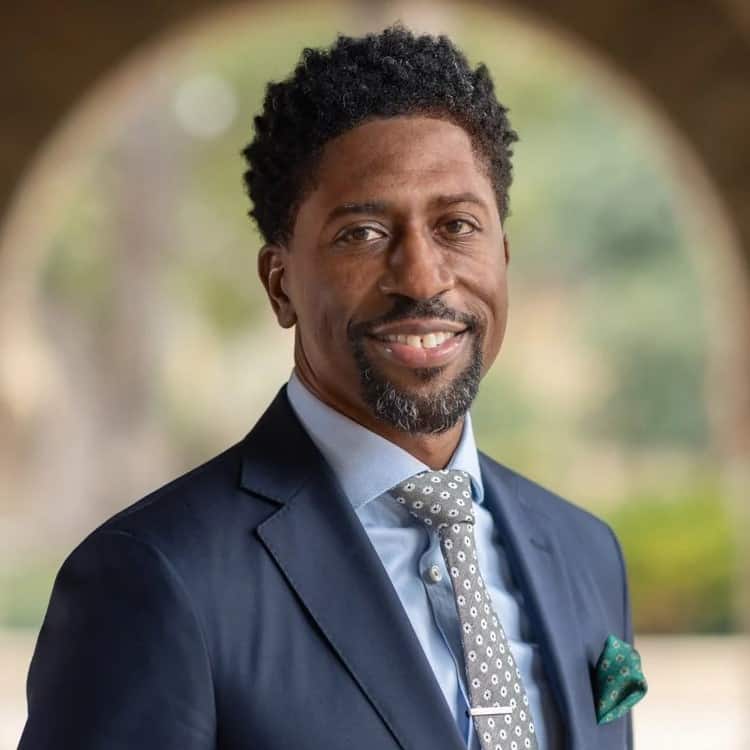
What Martin, now an associate professor of religion at Stanford, found in those files was this: Hoover was perhaps the most influential Christian leader in America during his tenure in office, promoting a gospel of America as a Christian nation and labeling anyone who threatened the power of white Christian men as communists and a threat to God’s will.
“Hoover saw his politics as nothing more than an extension of his faith,” said Martin, author of “The Gospel of J. Edgar Hoover: How the FBI Aided and Abetted the Rise of White Christian Nationalism.“ “And because America is a Christian nation, the FBI is charged with defending and perpetuating that ideal.”
Unlike early Christian nationalists, like Father Charles Coughlin — a star of early broadcast radio — or Gerald L.K. Smith, longtime editor of “The Cross and the Flag,” Hoover had the institutional power and discipline to make his beliefs stick. And he had a gift for convincing conservative Christian leaders to join his crusade.
When the Nation magazine ran a series of articles critical of the FBI and Hoover, legendary Christianity Today editor Carl Henry rode to his aid, offering to run one of Hoover’s essays in the magazine. When the essay arrived, Henry was effusive in his praise.
In his book, Martin documents how Hoover saw anyone who upset the status quo and pushed for goals like “love, justice, and the brotherhood of man” or “personal freedom” as part of an atheistic communist plot. He used the power of his office to investigate those who opposed him, including religious leaders like the National Council of Churches and the Rev. Martin Luther King Jr.
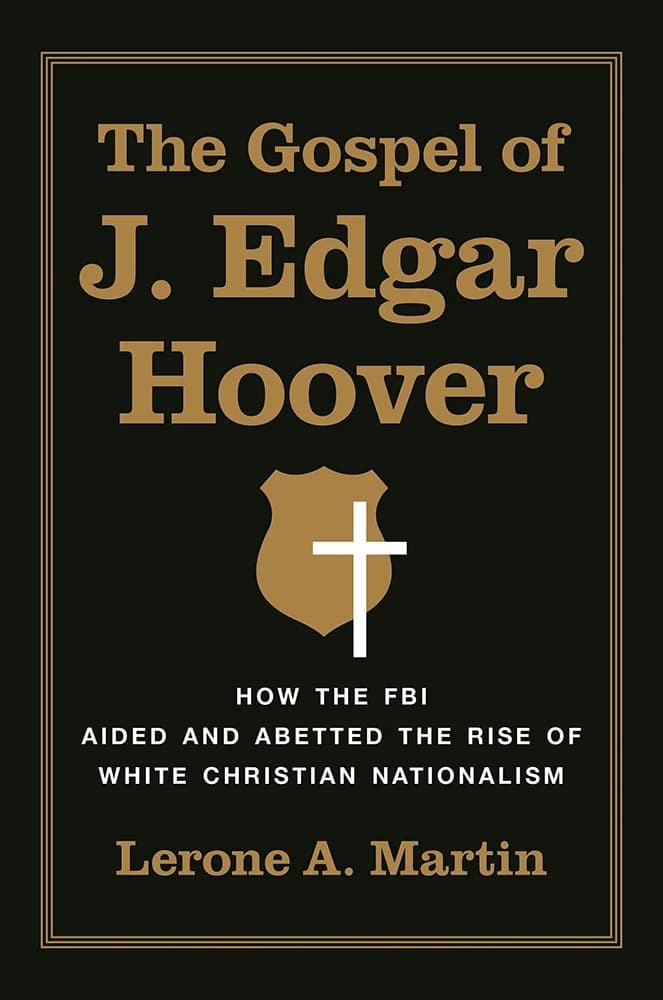
He turned his office into a bully pulpit, writing essays for major Christian publications, saying that all the nation’s problems — including issues of race — could be solved if only everyone gave their hearts to Jesus. The FBI then reprinted those essays, adding an FBI seal as if they reflected official government policies, and shared them with churches, Sunday schools and almost anyone who wanted them.
Some preachers even preached them word for word on Sundays, Martin recounts, complete with Hoover’s warnings of disaster if America strayed from its spiritual roots and the Marxists took over.
“We are today threatened by twin menaces,” he escribió in a 1961 essay for Christianity Today. “Materialism has fathered both crime and communism. The criminal statistics for the year just past attest to the steady growth of the one evil. The progress of the other — and the intensity of the struggle in which we are engaged with it — does not yield to such forthright measure.”
Many evangelical leaders were eager to join Hoover’s crusade against communism and liberals. They also saw the advantages of having Hoover as an ally, said Martin in an interview.
“What better way in the midst of a cold war to authenticate your organization than to have the approval of the FBI — the organization that knows all and sees all?” said Martin.
Evangelicals embraced Hoover even though he shared few of their theological convictions. He did not believe in being “born again,” said Martin, and never had the kind of conversion experience that is so essential to evangelical life. He also did not share evangelical prejudice against Catholics, which was common in the middle of the 20el century. Instead, Martin writes, he saw Catholics as essential partners.
“I am a Protestant,” he said in a 1939 address to a Catholic gathering in Washington, D.C., that is recounted in Martin’s book. “And as a Protestant, I say sincerely and from experience, that the Catholic Church is the greatest protective influence in our nation today.”
Martin writes that Hoover was a particular admirer of the Society of Jesuits and recruited Jesuit priests to train FBI agents to be spiritual warriors. The FBI held yearly retreats for agents at a Jesuit retreat house in Annapolis led by his friend, the Rev. Robert S. Lloyd, and donated a chalice engraved with “FBI” to Lloyd for use during Mass.
The agency also held an annual Mass and Communion breakfast for Catholic agents and an interdenominational vespers service for Protestant agents to counter rumors the FBI had been taken over by Catholics. At both, only White Christian agents were welcomed, Martin writes. Agents of color never received invitations.
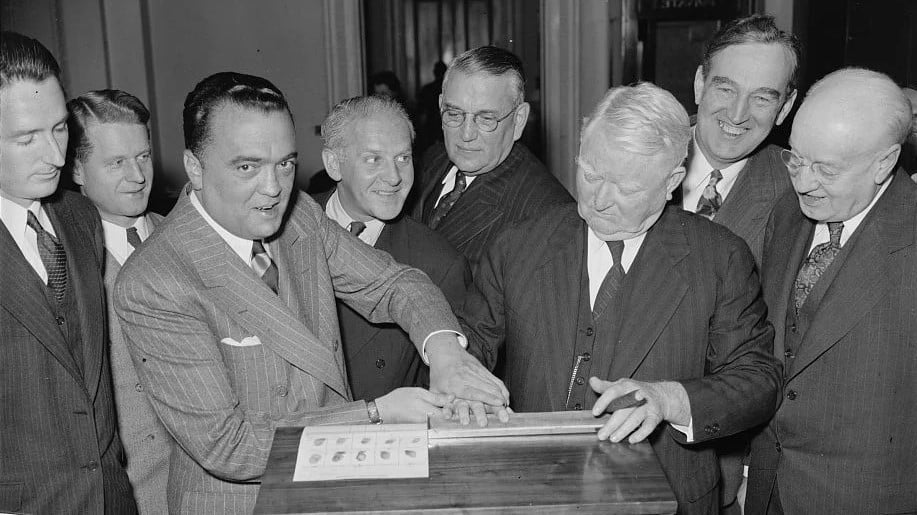
In an interview, Martin said Hoover was a true Christian nationalist, who believed he was working for God — not the Constitution or the American people. He saw enforcing the law as a spiritual battleground, said Martin, a view he developed as a teenage Sunday school teacher.
“He saw Sunday school as spiritual formation — and believed the Bible teaches you how to live your life in a moral way,” he said. “And if you follow the teachings of God, you will be a great American citizen. And then the reverse of that is — if you’re a criminal, that means that you didn’t get the spiritual teachings as a child. And if you did get them and are a criminal, you’ve just decided to reject them.”
Hoover’s commitment to law and order above all and his views of America as a white Christian nation led him to reject Martin Luther King Jr. and other leaders of the civil rights movement. Martin, who also directs the Martin Luther King Jr. Research and Education Institute at Stanford, said Hoover dismissed civil rights legislation as misguided and called King and other civil rights leaders “extremists.”
“Hoover’s gospel was focused on the individual soul,” Martin writes. “The best way to fix America’s race problem was not violence, protest, or legislation. Rather, individual and group piety was the best way for Black Americans to earn white respect and the eventual prize of equality.”
Any other approach, Hoover believed, was simply the work of communists.
Hoover remained influential for decades, said Martin, in part because he was a master at mythmaking. During his tenure, the FBI and its agents were cultural heroes, stars of “This Is Your FBI,” a popular radio program; television shows like “The Untouchables”; and a long list of movies. In the popular imagination, the FBI was America’s protector — which, combined with his endorsements of Christian America, turned Hoover into one of the most well-respected people in the country.
Martin said Hoover’s views — and his strategies — still shape American politics. Especially his habit of labeling all his enemies as socialists or Marxists. Doing that, Martin said, allowed Hoover to dismiss any criticism of American culture.
“Today we see people using ‘socialist’ the same way,” he said. “It’s a tactic where you don’t have to actually engage opposing ideas, you can just dismiss them while using that label.”
 Bob Smietana es reportero nacional de Religion News Service.
Bob Smietana es reportero nacional de Religion News Service.




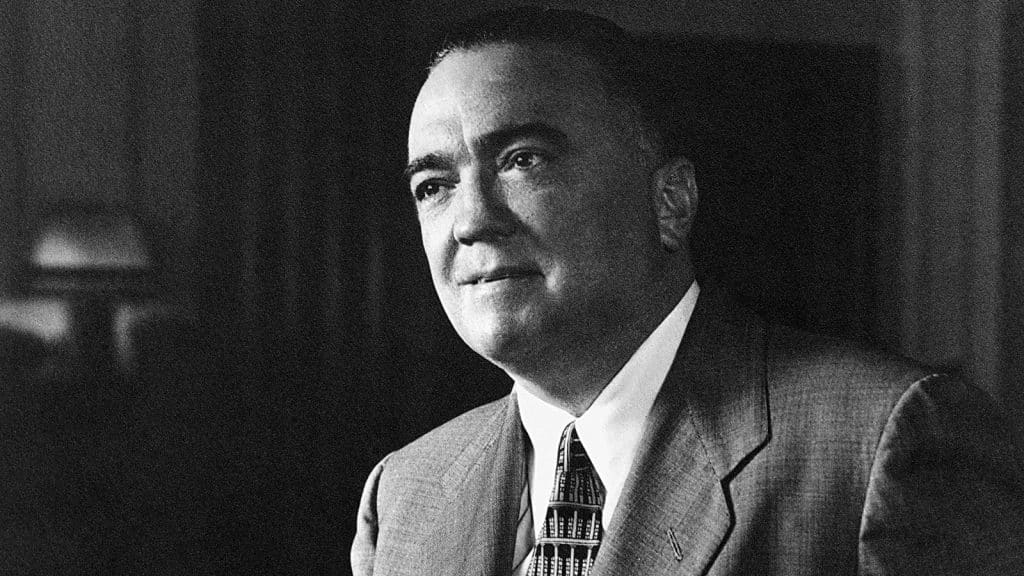

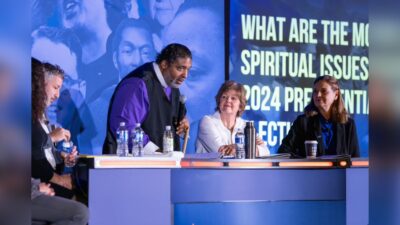
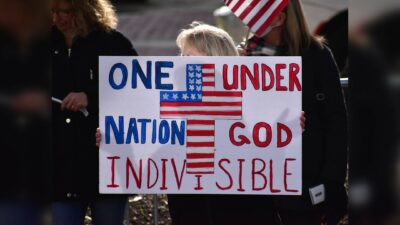

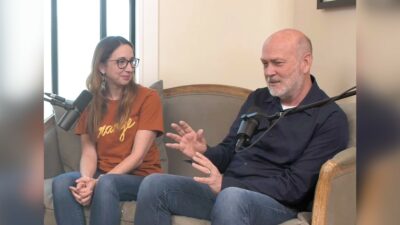
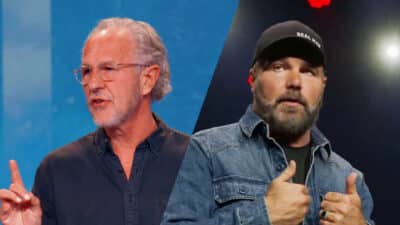








19 Respuestas
Thank you for this article. I did not realize the positive impact he had in the culture wars and the push against the secularization of our country. God certainly uses flawed people to see His will unfold.
“Flawed” makes it sound cute. Hoover was a bully and a racist who abused his power and trampled on the rights of others to get what he wanted. Nothing cute about that. The end does not justify the means.
Interesting how we tend to use harsh, judgmental, condescending hyperbole when talking about the sins of those we disagree with, but when it’s in our own backyard we go with tame phrases like “flawed” and “we’re all sinners”.
Gracias por este artículo.
“Hoover saw anyone who upset the status quo and pushed for goals like “love, justice, and the brotherhood of man” or “personal freedom” as part of an atheistic communist plot”
“The best way to fix America’s race problem was not violence, protest, or legislation. Rather, individual and group piety was the best way for Black Americans to earn white respect and the eventual prize of equality”
Oh how some things have NEVER changed. These beliefs still run rampant among white evangelical circles to this day. Just goes to show that if you don’t study history, you’re bound to repeat it.
Thanks for this brief book review. Hoover must have been a complicated and contradictory character. From this article I gather that he accurately viewed crime as a moral failure while also enlisting religious leaders, social allies, the entertainment industry, and news reporters in the agency’s often heavy-handed response to crime and to his perceived enemies. And perpetuating racist and sexist views that were common among his cohort.
Some historians believe that Hoover had a long-term homosexual relationship, and I’m wondering if Mr. Martin addresses those allegations.
I like Jon Stewart’s take on woke.
Hey all, just found out I’m woke! All this time I just thought I was good at history.
—Jon Stewart
Hmmm. Agenda journalism at its most delicious. Isn’t creating a deceptive narrative by omission some sort of sin?
No mention of the FBI’s heroic efforts against the Ku Klux Klan?
A snippet from history: “Special Agent Ingram: “There was one thing about [theCivil Rights Act], Mr. Hoover knew that it was important. He gave Inspector Joe Sullivan and [Jackson Special Agent in Charge] Roy Moore a mandate. And he said, ‘You will do whatever it takes to defeat the Klan, and you will do whatever it takes to bring law and order back to Mississippi.’”
Also, there were real anti-American, Soviet-inspired Communists involved in various movements in America, though it is certain people were unfairly and unjustly linked by association.
Also, the television show The Untouchables was not about the FBI, and Mr. Hoover hated it for suggesting Treasury Agents solved FBI cases.
Wayne-
This is about Hoover and Christian nationalism – the FBI and KKK are off topic. We need to sit (un)comfortably with the complex person Hoover was; not do a “whataboutism” to make it feel or sound better. We all know that no one person is 100% good or bad; and we have to let “bad” stand as-is, so that there is a lesson learned. Deflecting just downplays it.
Ironically, “agenda journalism” is exactly what many have tried to fight against when wanting to teach the full truth about our nation’s history in classrooms. But this “agenda history” is labeled “patriotism” or “teaching kids to have pride in our country”, while those who want to include more Black history or discussions on the impact of slavery and Jim Crow are shouted down with accusations of “woke” (I still hate the misuse of this word) or “CRT”.
I mean, banning the Autobiography of Ruby Bridges because it mentions “white mobs” yelled at her when she was trying to integrate her school? Good grief.
Wanting the truth out goes both ways.
Marin, for me it is about journalistic ethics. When you are promoting an agenda driven book, and use dishonest “shaping the narrative” techniques as a journalist, and don’t bother seeking other perspectives or providing context, it is very poor work. I belive it is dishonoring to Christ, and makes the Roys Report look bad when it is important that it does not look shoddy. That makes it easier to close the ears on issues that matter much more than Mr. Hoover. That said, I am fine with a clear-eyed, fair look at Mr. Hoover, who, like all men, was a complex individual. The word “fair” should be double underlined.
My question is if your issue is with the TRR’s covering of the book, the book itself, or the author of the book (Martin)?
It’s my understanding that TRR is telling us about this book in and of itself, and the author’s approach to this particular topic.
If the book doesn’t cover the FBI and the KKK – and the article is on what the book DOES cover (Hoover and his impact on Christian nationalism) – are YOU being fair (or realistic) in your expectations of TRR? If you don’t like the author’s approach (or what the author did or did not include), isn’t your issue with the author?
As for me, if I’m reading a book review, I’m expecting to read about what’s in the book, and the author’s approach in writing the book. I also think a book review is different from “promoting” it.
Wayne, could you please name the source for your snippet from history?
Regina, I believe you can find it on the FBI official history page, which includes transcripts of Special Agents being inteviewed about their work against the KKK out of the Jackson Field Office in Mississippi in 1964. It is quite fascinating. I recommend seeking out information on Agent Jim Ingram, a true American hero, and a great human being.
His biographer was asked: Where did Ingram develop his deep commitment to civil rights?
He answered: “As far as I know, Jim Ingram never read a book on civil rights growing up in rural Oklahoma. He developed his concept of equal rights based on how he saw women, blacks and Native Americans treated as he was coming of age in Oklahoma. For him it was all about right and wrong. He was a people person in every respect.
Thank you Wayne, I also found it on the online FBI history of itself. I wondered if you had any outside sources that confirmed your snippet.
Can you give me the name of a book perhaps?
Regina, these statements are from FBI transcripts. I have not read the book in a long time (though it is worth revisiting). The title is “”The Hero Among Us: Memoirs of an FBI Witness Hunter.” The FBI’s work in Mississipi is quite well known, and all under Hoover’s direct orders to break the KKK. There is a good, balanced view of Hoover in The Atlantic article called “How Hoover Took Down the Klan.” It acknowledges, as good journalists do, Hoover as a complicated man, and rightly exposes his very real excesses, but also indeed credits him with being the driving force against lawless Klan activity.
Interesting read. I’m reminded that the Jesus Movement in its original form as well as evangelical left movements like Sojourners pushed back against this amalgamation of the evangelical and Catholic right with the politics of the political right. Sad that we’re right back there again and we will be as long as partisan politics dominates our churches.
Wayne,
Hoover was one of the most corrupt and powerful law enforcement officers who ever lived. The fact that he abused his power in the name of Jesus should make us all sick.
In 1956, Hoover created the now-notorious COINTELPRO program to “disrupt,” “discredit” and “neutralize” radical organizations and their leaders. The FBI forged documents, spread derogatory rumors, conducted warrantless break-ins and engaged in illegal surveillance, among other tactics. It sought to break up marriages, disrupt meetings, destroy reputations, provoke rivalries…
He undertook a campaign against suspected gay and lesbian people working for the federal government, putting together more than 360,000 files in hopes of removing “sexual deviates” from their jobs.
One of the bureau’s chief targets was Martin Luther King Jr.
Publicly, Hoover called King “the most notorious liar in the country.” Privately, he called him a “burrhead” who needed to be destroyed. At Hoover’s direction, FBI agents planted wiretaps in King’s home and office, and placed bugs in his hotel rooms, and then peddled what they’d learned about his sex life to the press.
Historian Taylor Branch says that Hoover “manipulated” Atty. Gen. Robert Kennedy to sign off on the King wiretaps with “implicit threats” about revealing John Kennedy’s extramarital affairs.
https://www.latimes.com/opinion/story/2022-05-02/j-edgar-hoover-name-fbi-director-fbi-building-racist-homophobic-legacy
Wayne, my question is this-
If people like J Edgar Hoover (or Donald Trump, or Jenna Ellis) have to lie, cheat and steal to bring about Gods will in America and to purify this nation, are they really doing God’s will? Is this really making America more pure?
Of course not, Greg. Good heavens. I am the last person on planet earth to vote for Donald trump.
Are they really doing God’s will? Why not? He raised up the Chaldeans in Habakkuk 1:6.
I had not heard this about Billy Graham, but it makes perfect sense.
I am profoundly grateful for The Roys Report and for the obvious Christian maturity of Julie Roys as evidenced by when she interjects within a comment string and when she refrains, as well as by the dead-on-target content that she shares when she does interject.
The comment strings draw me like a flame draws a moth – certainly not always for the good.It seems the most populated strings always include an element of the sins of Donald Trump; less frequently but just as passionately, the sins of Joe Biden. But, I think the real point of TRR is to point out to me the sins of David Till, whether political, social or spiritual – and to prompt my personal repentance. Thank you Julie and thank you TRR!